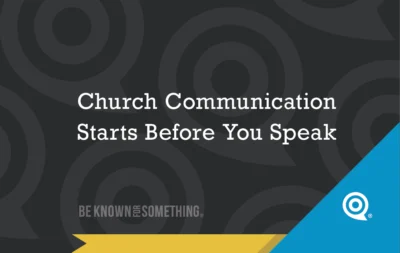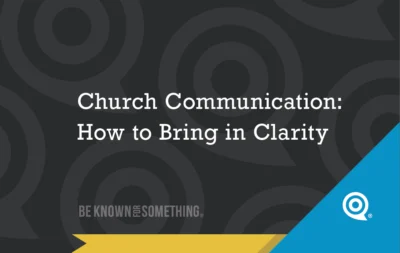Tell Them What to Say (But Be Careful)

“You’ve got to try Bob’s restaurant! Their food has unexpected ingredient combinations!”, your friend says. So the next time someone asks “where should we eat?”, you suggest Bob’s. And then without thinking, you say “because I hear they have unexpected ingredient combinations”. You go and no matter how good the service, awesome the parking, amazing the drinks; you judge the place based on their unexpected ingredient combinations. Once it lives up to your expectations, you’ll emphatically declare to everyone that they must go because of their unexpected ingredient combinations.
The power of good communications is the ability to get people to understand the “main” benefit of something so they’ll share it. It’s what you want to be known for.
Want people to come to your church? Tell your members what to say.
Plant into their minds the key benefit of attending your church. Something that’s compelling enough to get someone else to try your house of worship. If you don’t say it for them first, each will be tempted to say different things.
“Why do you go to Redeemer Church?”, someone asks. “Because I grew up there”, “Because it’s close to my home”, “My friends go there”, “I’ve always gone there”, are the answers most churches get. None of them are compelling for someone who’s not connected already.
Instead, control what’s said by continually telling everyone what to say. But be careful. Here are 4 things to consider before telling them something:
- Ensure it’s believable and authentic. If Bob’s menu doesn’t use unexpected ingredient combinations, they’ll never become known for it. Make sure you tell them something you’re doing really well and “most” would agree. Make sure it’s worded in a way that “most” would say; avoid weird semantics and cleverly alliterated phrases. They’ll sound too much like a marketing phrase and lack authenticity.
- Make sure it’s desired in your community. If Bob’s restaurant is in a community who loves plain meat and potatoes, they’ll fail. Make sure you tell your congregation something that their neighbors and co-workers would want to experience or receive.
- It must have a core benefit. Think about the community’s prominent needs or goals and consider telling people about your solution to the needs, or path to their goals. For example: “I realized my family needed help getting along”, “My marriage found new life”, or “Sunday’s gave my work week purpose”.
- It has to be easy to remember. Try to keep it to one concept, very short, and memorable. It’s not really about the complete syntax, it’s about the keywords in the phrase.
Once it’s something that everyone’s saying, you’ll become known for it. Say it from the pulpit, in your promotions, on your website. Everywhere. You’ll reach your community easier. Because they’ll tell someone, who’ll tell someone else, and so on, and so on. Like Bob’s restaurant.
Want 25 Game-Changing Resolutions?
Related Posts

Church Communication Starts Before You Speak
Church communication does not begin with a sermon. Instead, it begins the moment someone arrives on your property. Before a

Church Communication: How to Bring in Clarity
In the new year, pastors often set goals. They want to grow attendance, launch new ministries, or strengthen discipleship. However,

Church Branding: Why Every Church Is Known for Something
Everyone is known for something, including your church. This is the heart of church branding. The real question isn’t whether

